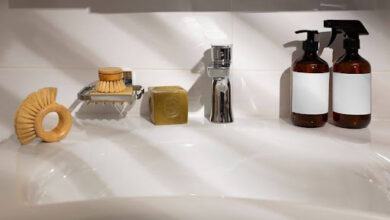Freestanding Bath: A Buyer’s Guide
Freestanding baths have become a popular choice for modern bathrooms, offering a perfect blend of style, comfort, and functionality. If you’re considering adding a freestanding bath to your home, this comprehensive buyer’s guide will help you understand everything you need to know to make an informed decision.
What is a Freestanding Bath?
A freestanding bath is a bathtub that stands alone and is not attached to a wall or built into a surround. This type of bath can be placed anywhere in the bathroom, making it a versatile and stylish centerpiece. Freestanding baths come in various shapes, sizes, and materials, allowing you to find one that fits your bathroom’s design and your personal preferences.
Why Choose a Freestanding Bath?
- Aesthetic Appeal: Freestanding baths create a luxurious and elegant look, instantly elevating any bathroom space.
- Flexibility in Placement: Because they don’t require wall mounting, you can position the bath in the most convenient or visually appealing spot.
- Comfort: Many freestanding baths are designed with ergonomic shapes that offer a comfortable bathing experience.
- Variety of Styles: From classic clawfoot tubs to sleek modern designs, there is a freestanding bath to suit every taste.
Materials Used in Freestanding Baths
Choosing the right material is crucial as it affects the bath’s durability, heat retention, maintenance, and price. Common materials include:
- Stone Resin: A composite of natural minerals and resin, stone resin baths are durable, non-porous, and excellent at retaining heat. They offer a smooth, matte or polished finish and are relatively easy to maintain.
- Acrylic: Lightweight and affordable, acrylic baths are easy to clean and come in many shapes. However, they may scratch more easily than stone resin.
- Cast Iron: Known for their durability and excellent heat retention, cast iron baths are heavy and require sturdy floor support.
- Copper and Other Metals: These offer unique aesthetics and great heat retention but can be expensive and require special maintenance.
Size and Shape Considerations
Freestanding baths come in a range of sizes, typically from 1500mm to 1800mm in length. When choosing the size, consider:
- The available space in your bathroom.
- How many people will typically use the bath.
- Whether you want a deep soaking tub or a more shallow design.
Shapes vary widely, including oval, rectangular, slipper (one end higher for back support), and circular. The shape you choose will impact both the look and comfort of your bath.
Installation and Plumbing
Freestanding baths are generally easier to install than built-in tubs because they don’t require a surround. However, plumbing must be planned carefully:
- Floor-Mounted Taps: Often used with freestanding baths, these require plumbing through the floor.
- Wall-Mounted Taps: Possible if the bath is placed near a wall.
- Freestanding Taps: These stand independently and can be positioned anywhere around the bath.
Make sure your bathroom floor can support the weight of the bath, especially for heavier materials like stone resin or cast iron. You may need to consult a professional for structural advice.
Maintenance and Cleaning
Maintenance depends largely on the material:
- Stone Resin Baths: Easy to clean with mild soap and water; avoid harsh chemicals that can damage the surface.
- Acrylic Baths: Clean with non-abrasive cleaners to prevent scratching.
- Cast Iron Baths: Require regular drying to prevent rust if the enamel coating is damaged.
- Metal Baths: May need special cleaning products to maintain their finish.
Regular rinsing and drying after use help prevent soap scum and water stains.
Pros and Cons of Freestanding Baths
Pros:
- Stylish and luxurious appearance.
- Flexible placement options.
- Wide variety of styles and materials.
- Comfortable designs for soaking and relaxation.
Cons:
- Typically more expensive than built-in baths.
- Require more bathroom space.
- Heavier materials may need floor reinforcement.
- Plumbing installation can be more complex.
Budget Considerations
Freestanding baths vary widely in price depending on size, material, and brand. Acrylic models are generally the most affordable, while stone resin and cast iron options tend to be pricier due to their durability and heat retention qualities. Remember to factor in installation and any necessary structural modifications when budgeting.
A freestanding bath can transform your bathroom into a luxurious retreat and provide years of comfortable use. By carefully considering your space, preferred materials, style, and budget, you can select the perfect Baulane freestanding bath to suit your needs. Whether you opt for the modern elegance of a stone resin bath or the classic charm of cast iron, this investment will add both value and beauty to your home.
Take your time exploring options, and don’t hesitate to consult with bathroom design professionals to ensure your freestanding bath is both a stunning and practical addition to your space.


